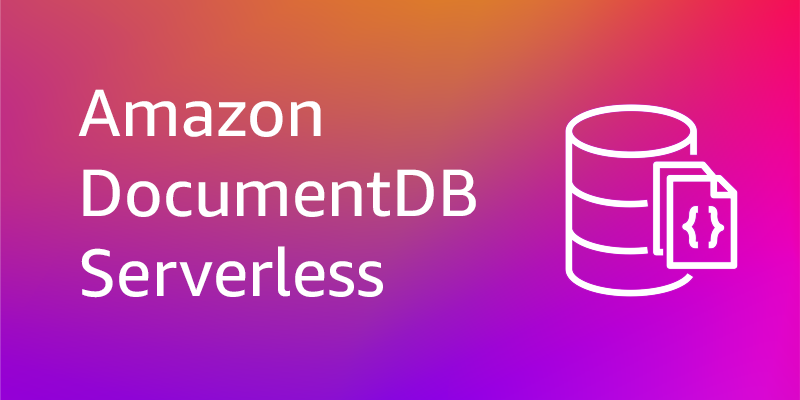 BIG DATA
BIG DATA
 BIG DATA
BIG DATA
 BIG DATA
BIG DATA
Amazon Web Services Inc. is adding to its serverless database offerings with the launch of Amazon DocumentDB Serverless.
Launched in general availability today, Amazon DocumentDB Serverless is a fully managed database service that’s designed specifically for storing, querying and indexing document data structures. Because it’s serverless, it can adjust its capacity automatically, based on the customer’s demand, without any need for customers to make any alterations or manage the underlying infrastructure resources. According to Amazon, this makes it ideal for new “agentic” artificial intelligence workloads.
Amazon DocumentDB Serverless stores data in JSON-like formats, which means it can support flexible data structures including single-field, compound and multi-key indexes — essentially, any kind of enterprise document. It’s built on the Aurora storage engine, which separates compute and storage to allow these resources to scale independently.
The serverless aspect means that customers can reduce their expenditures by up to 90% compared to a traditional, managed database that needs to be provisioned and constantly maintained. It eliminates the need for complex resource planning, scaling automatically in step with application demand, all the way up to millions of requests per second, Amazon said.
Amazon said DocumentDB Serverless can support a wide range of applications, such as storing player profiles in a global, online video game played by millions of people, or managing a catalog for an e-commerce store that indexes hundreds of thousands of different products. The beauty of the service is that it constantly monitors its own activity, scaling up when demand increases to provide just the right amount of capacity.
That means customers aren’t wasting money by provisioning too many resources, while also saving on infrastructure management costs. When demand drops, the database will reduce the resources it uses accordingly, so customers don’t need to pay for the servers and storage capacity they’re no longer using.
One major advantage of Amazon DocumentDB is that it’s compatible with the popular MongoDB document-oriented database, so developers can easily migrate workloads between the two. It also has similar features, including global clusters, vector search capabilities for AI applications and support for multi-availability zone deployments.
The company was keen to stress that Amazon DocumentDB Serverless is an ideal platform for certain kinds of AI agents, which are advanced AI systems that can perform many kinds of tasks on behalf of humans, with minimal supervision.
That’s thanks to the unpredictable nature of AI agent workflows, which can suddenly become extremely busy after a long period of inactivity. Amazon gave the example of a travel company that offers an AI agent for planning trips.
Each time customers use its app, they’ll interact with this agent, and with each request they could potentially trigger multiple interactions. Now let’s imagine this travel company is running a promotion. Its website might suddenly face an explosion of demand, with hundreds of thousands of individuals all triggering AI agents to search for hotels, car rentals and holiday activities.
Because the travel agent doesn’t really know how many customers are going to interact with its AI agents, it’s almost impossible to forecast demand accurately and optimize resource allocation. With Amazon DocumentDB, they don’t have to worry about that, since the database will automatically scale up and down based on how many people are currently using its AI agents to plan their trips.
AWS Vice President of Databases Ganapathy Krishnamoorthy said the company’s serverless offerings have made database management almost effortless for hundreds of customers already.
“The rise of agents has put unprecedented demands on databases, magnifying the importance of data as a differentiator for customers,” he explained. “Our serverless databases provide customers with a foundation capable of supporting these more dynamic and unpredictable workloads, so they can seamlessly scale to meet demands, reduce operational costs by always deploying the right amount of capacity, and simplify their operations.”
The video game development platform AccelByte Inc. has been using Amazon DocumentDB Serverless for some time already while the service was in beta. It uses the service for operations such as messaging, matchmaking and storage, and it often faces unpredictable surges in player numbers, as a result of video games hosting special events or launching new features.
“Amazon DocumentDB Serverless is exactly what our team needs to adapt to dramatic shifts in player usage, ensuring we can deliver reliable, cost-effective scaling to meet the needs of our customers,” said AccelByte Vice President of Engineering Tony Fu. “Now we can eliminate capacity planning for our database workloads and allow our engineers to focus on feature development.”
Constellation Research Inc. analyst Michael Ni said the launch of DocumentDB Serverless demonstrates how Amazon is increasingly “weaponizing” serverless databases as it strives to make its cloud look more appealing for AI agents.
“DocumentDB Serverless gives enterprise’s MongoDB-compatible document workloads a cost-effective and elastic backend,” he explained. “This is needed to run document-oriented workloads with high variability, including LLM agents and SaaS tenant-based architectures. This continues AWS’s broader move to try and own the full stack for agentic AI.”
Amazon DocumentDB is just the latest in a growing list of serverless databases offered by Amazon. The cloud infrastructure giant launched its first serverless offering, Amazon DynamoDB, back in 2012, and has since expanded to Amazon Aurora DSQL, Amazon Neptune, Amazon ElastiCache, Amazon EMR, Amazon MSK and Amazon Aurora Postgres.
Support our mission to keep content open and free by engaging with theCUBE community. Join theCUBE’s Alumni Trust Network, where technology leaders connect, share intelligence and create opportunities.
Founded by tech visionaries John Furrier and Dave Vellante, SiliconANGLE Media has built a dynamic ecosystem of industry-leading digital media brands that reach 15+ million elite tech professionals. Our new proprietary theCUBE AI Video Cloud is breaking ground in audience interaction, leveraging theCUBEai.com neural network to help technology companies make data-driven decisions and stay at the forefront of industry conversations.